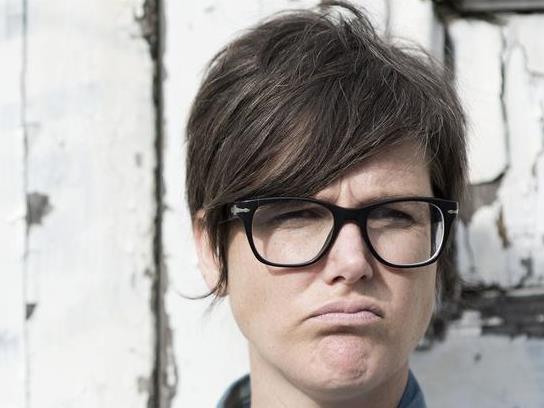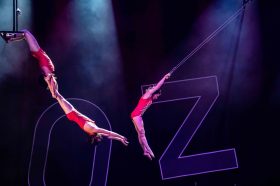In the beginning of Donkey, comedian Hannah Gadsby blatantly proclaims the show is not about donkeys. However, she does make a decent donkey analogy about midway through her performance, and also, fittingly, a pufferfish reference. The animal motifs are far and few between as Donkey shows Gadsby setting out to cement her place as one of the finest contemporary Australian comics.
Gadsby participates in neither observational comedy nor shock humour. Instead, she proclaims to belong to a niche of ‘depression humour’. She ventures into dark territories that chiefly concern her mental issues and relationship with her partner. She complains about washing dishes and sorting her socks, which appear as seemingly ordinary moments of domesticity. However, Gadsby is frustrated by her own self-imposed inaction, being trapped in an endless cycle of internalised overthinking and self-loathing. While this sounds as pretty dire stuff for a comedy show, Gadsby’s immense likeability allows these sombre topics to be a fodder for entertainment.
While Gadsby undoubtedly prepared laboriously for her show, her material comes across more as personal anecdotes rather than strict comedic routines. Her stripped down onstage persona renders her material as innately private moments, to the point where it borders on the uncomfortable. With the audience as her confidante, Gadsby creates an intimate atmosphere where she daringly explores grave matters. At one point of the show, Gadsby mentions a startlingly tragic truth about her past. ‘That’s not funny,’ an audience member whispers, though affectionately rather than critically. Clearly, Gadsby’s unnerving reveal is risky, the audience winces and gasps rather than laughs, yet her skilful blend of frank charm and bold vulnerability evokes a profound feeling of compassion; a rare feat for a one-hour comedy show.
Most of all, Gadsby turns these bleak instances into something relatable. Her ‘life is hard’ mantra is, after all, a very human experience. Her self-deprecating humour might be seen as near grating to some, especially with the show’s running theme of her inability to handle social situations. Even so, Gadsby’s affable and laidback nature means her personal disclosure is not a means for self-pity, but rather, a form of self-expression that is unusually cathartic — for both the comedian and the audience.
Crucially, Donkey’s strongest point is Gadsby’s methods in inviting the audience into her mad, mad world. From her complaints about a smug barista to her musings on her newfound role as a ‘lesbian stepmum’, Gadsby constructs an arena filled with uneasy but solidly funny moments. The show’s hysterical finale has Gadsby in some form of a drunken stupor. She flails onstage in a hilariously silly manner, while also exhibiting a certain reckless abandon. The finale is like taking a peek behind a suburban teenager’s closed bedroom door, only to typically discover a scene more laughable than scandalous. The show’s ending is irresistibly delicious.
An intricate mix of humour and pathos, Donkey shows Gadsby turning the grim and melancholic into something that is highly enjoyable. Tied in with an undercurrent of resilience against the toxic, dark corners of the mind, Gadsby’s uninhibited performance proves to be exceptionally engaging.
Rating: 4 stars out of 5
Donkey
Hannah Gadsby
Melbourne Town Hall
March 26 – April 19
Melbourne International Comedy Festival
www.comedyfestival.com.au
March 25 – April 19





